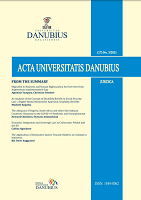An Analysis of the Concept of Disability Benefit in Social Security Law: a Rights-Based Interpretive Approach
An Analysis of the Concept of Disability Benefit in Social Security Law: a Rights-Based Interpretive Approach
Author(s): Mashele RapatsaSubject(s): Human Rights and Humanitarian Law, Labour and Social Security Law
Published by: Editura Universitară Danubius
Keywords: disability benefit; human rights; social security; social transformation; human wellbeing;
Summary/Abstract: South Africa’s constitutional supremacy system has promulgated a variety of legislative instruments that protects people living with disabilities. In terms of labour laws governing employment relationships, this is particularly buttressed by a wide range of existing antidiscrimination doctrines, laws and policy measures that prohibits unfair differentiation of persons and discrimination based on a person’s disability status. This article analyses the contextual meaning of a disability benefits, with specific focus on critical component of the definition in accordance with the provisions of Labour Relations Act 66 of 1995 (LRA), Compensation for Occupational Injuries and Diseases Act 130 of 1993 (COIDA) and the Occupational Health and Safety Act 85 of 1993 (OHS).This is important because social security measures are in principle predicated on alleviating possible suffering that occurs when a person is incapable of sustaining oneself socio-economically. Therefore, the article captures a rights-based argument that embraces an all-encompassing meaning of disability benefit in order to fulfill the spirit and purport of the Constitution’s social security initiative regarding workplace incidents that render an employee to be disabled. Methodologically, the article adopted a traditional doctrinal legal approach. It is asserted that there is in inherent interaction between disability and poverty. Hence, it is crucial for poverty alleviation mechanisms to capture disability as a ground of justification when determining the safety net of disability benefits. This is because an employee who become disabled is more vulnerable to poverty and associated socio-economic risks, and is likely to experience acute impediments in various social settings.
Journal: Acta Universitatis Danubius. Juridica
- Issue Year: 17/2021
- Issue No: 3
- Page Range: 23-35
- Page Count: 13
- Language: English

